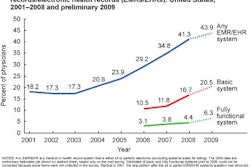
As I finish the manuscript for this column, the House and Senate have passed two different healthcare "reform" bills; what emerges from conference committee is yet to be seen. No matter how the current legislation fares, sooner or later some type of reform will be enacted into law -- after all, it's really about control, a drug far more powerful than heroin to the political class.
 |
| Healthcare business and legal affairs expert Mark F. Weiss. |
It's also highly likely that whatever eventually emerges legislatively will result, practically, in cost overruns, higher taxes, and reduced payments to providers. Bureaucrats will revel in controlling the means while having no responsibility for achieving the ends, and rationing of one type or another will occur.
But look at the bright side: For your purposes, the steps that you need to take, right now, to thrive in the face of this looming future are the same no matter what the eventual reform law will look like.
So what is it that your radiology group can do? Although the situation may be complex, the answer is simple -- you have two choices: You can do nothing, or you can immediately take steps designed to dramatically increase the chances that your group will thrive. Note that I didn't say "survive," as survival in the context of a governmentally controlled system means to capitulate. Sorry, but there is no middle ground.
Assuming that you don't want to wave the white flag, your group should take the steps described below.
Admit that your group is a business
Yes, you are radiologists and your group is a professional practice, but if it's going to thrive, you have to understand that it's also, and foremost, a business. Therefore, it must act like one.
Your group must become strategic on multiple levels. It must develop an overall business strategy. It must develop substrategies for each particular instance previously thought to be independent, e.g., an exclusive contracting strategy and a data management strategy, that are consistent with the group's overall business strategy and which take into account the interrelationship among the various substrategies. Finally, just as the strategies are aligned, the tactics employed in furthering each of the particular substrategies must also be coordinated.
Leadership
Beyond the smallest of groups, leadership cannot be by consensus or paralysis will set in.
Successful groups must have leaders and leaders must be allowed the time required to lead and the ability to fail without fear of retribution.
Just as leaders need this freedom, group members are owed faithful performance: If your homebuilding contractor told you that he was too busy to pay attention to the organization of the job because he was spending all day hammering nails, you'd think about getting a new contractor. But most groups aren't fazed when their "leader" essentially uses the same excuse, or when the group guarantees the same result by tying its leader's hands to a full share of patient care responsibilities, ensuring that he or she has little to no time left to devote to true leadership.
Payor exam
There's only so much discount that any radiology group can give and still remain a viable concern. This fact is often lost to groups that have significant Medicare and Medicaid populations and then permit managed care payors to extract large discounts.
This problem will only get worse as "reform" pushes more patients into the Medicaid population or into government-sponsored plans that are at or near Medicare level reimbursement.
Accordingly, your group must immediately examine its relationship with each currently contracted payor and adopt a strategy to maximize reimbursement.
Group-member relationship
As difficult as this might be, you need to examine the relationship between the group and its members, both partners and employees/subcontracted physicians alike.
Just as ships have closable, watertight compartments to avoid the loss of the entire ship in the event of a leak, the group must have the ability to reduce compensation to, shift work away from, or even jettison a member in the event that this is required to ensure the group's existence.
Re-examine compensation plans
If need be, your group's compensation plan must be restructured to promote maximum flexibility.
Although there are many ways to structure a compensation plan, no matter how yours is structured, it must be refined to avoid locking the group into a fixed level of compensation, whether in terms of absolute dollars or fixed per-unit/time worked. If the group does not have the ability to quickly adjust the amount of cash outflow, a cash flow crisis, even if temporary, could result in its insolvency.
Strategic view of hospital contracting
You must embark upon a long-term strategy in connection with the group's relationship with each facility. Because "reform" will likely result in a tightening of finances for both radiology groups and hospitals, you must create a series of unique experience monopolies -- the experiences you provide to your referral sources, patients, and hospital administrators -- to build the leverage necessary to allow the group to extract financial support from facilities. This requires long-term thinking and implementation.
Framing the issues
Despite compliance issues, facts, and budgets, emotion plays a leading role in decision-making. Not only is telling the better story essential, choosing the theme of the story is required. Nowhere is this more true than in establishing the relationship between your group and a hospital.
Relationships and negotiations, just like conversations, do not take place in a vacuum; they take place in a context or "frame." Understand that there's a battle on the meta level to frame the issues and that winning it can determine the outcome of the more observable conflict.
Touch points
Your group's leaders, especially the younger ones, must understand that negotiation is not something that happens only in a boardroom.
Hallway chat with a hospital CEO is often interpreted (correctly, from his or her point of view) with the same solemnity as comments made at a formal board meeting.
Each touch point with hospital administration, with other members of the medical staff, and with patients and their families is actually an element of the process of building support for your group's positions. Everyday interactions affect the group's image. To advance the group's interests, you must control or influence as many of those touch points as possible.
Political leadership
The group and its individual members must become politically active on the medical staff, in the local community, and regarding issues affecting your future on both the state and national level. It also means electing radiology society leaders who are willing to push for your financial interests, and it means calling for the resignation of leaders who are prone to co-opt your long-term security for their short-term political gain.
Give me a lever long enough ...
Successful groups understand that they must create leverage. By having options to the deal -- in respect of facility contracts, contracts with employed or subcontracted physicians, and relationships with other third parties -- they create tremendous negotiating leverage.
In particular, in connection with their exclusive contracting relationships, they avoid the most significant mistake a group can make: Permitting the hospital to believe that the group's mere existence turns on the hospital's decision to grant or renew the exclusive contract.
It's about time
You must start this process now, because achieving a transformational result requires a long-term view, optimally several years. After all, the goals are long term: group and member physician success. An understanding -- in fact, an expectation -- that it will take time and effort to achieve these results is necessary and required.
But it's not about a timeline
Progress in positioning your group to achieve maximum power in its relationships, and, therefore, to thrive, is not a linear process. The process involves an ongoing series of interrelated strategies and tactics. Each of its elements, once started, continue.
In duality, each is both independent and dependent: independent in that each element is focused on a particular goal; dependent in that each strategy and tactic supports the others in achieving the group's overall business goal. Instead of the image of a timeline, picture an atom -- each of the electrons revolves independently, but they all revolve around the nucleus.
Hardly any guarantees
No one can guarantee the outcome of the current "reform" debate, and no one can guarantee that if you take each of the foregoing steps, and the many more that are required to thrive, your group actually will.
Plans go awry and there will be challenges to your strategy along the way. In fact, there will be countless minor and major challenges thrust at you in countless ways. But the beauty of a strategic outlook consisting of interlocking steps is its flexibility, while still guiding you to your envisioned future.
Come to think of it, there is one thing that I can guarantee: If you simply continue to conduct business as usual, chances are that you will not thrive and, instead, will probably fail to survive.
By Mark F. Weiss
AuntMinnie.com contributing writer
January 13, 2010
Mark F. Weiss is an attorney who specializes in the business and legal issues affecting radiology and other physician groups. He holds an appointment as clinical assistant professor of anesthesiology at University of Southern California's Keck School of Medicine and practices nationally with the Advisory Law Group, a firm with offices in Los Angeles and Santa Barbara, CA. Mr. Weiss provides complimentary educational materials to our readers. Visit www.advisorylawgroup.com for his free newsletter. He can be reached by e-mail at [email protected].
Related Reading
The Profit Center: Part 10 -- Taking on risk with dubious reward, January 4, 2010
The Profit Center: Part 9 -- Securing customer satisfaction, November 11, 2009
The Profit Center: Part 8 -- Deploy the power of persuasion, October 30, 2009
The Profit Center: Part 7 -- Increase negotiating power by controlling context, September 11, 2009
The Profit Center: Part 6 -- Imaging Advantage: Much ado about the same old thing? August 18, 2009
Copyright © 2010 Mark F. Weiss



















